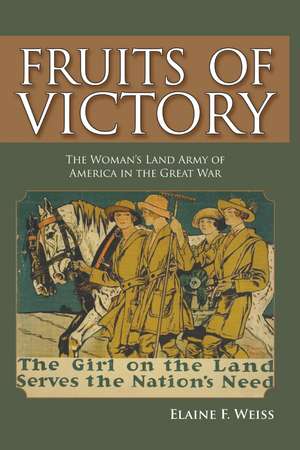Fruits of Victory: The Woman's Land Army of America in the Great War
Autor Elaine F. Weissen Limba Engleză Paperback – 14 aug 2015
Imagine a more controversial Rosie the Riveter—a generation older and more outlandish for her time. She was the “farmerette” of the Woman’s Land Army of America (WLA), doing a man’s job on the home front during World War I.
From 1917 to 1920 the WLA sent more than twenty thousand urban women into rural America to take over farm work after the men went off to war and food shortages threatened the nation. These women, from all social and economic strata, lived together in communal camps and did what was considered “men’s work”: plowing fields, driving tractors, planting, harvesting, and hauling lumber. The Land Army was a civilian enterprise organized and financed by women. It insisted on fair labor practices and pay equal to male laborers’ wages for its workers and taught women not only agricultural skills but also leadership and management techniques. Despite their initial skepticism, farmers became the WLA’s loudest champions, and the farmerette was celebrated as an icon of American women’s patriotism and pluck.
The WLA’s short but spirited life foreshadowed some of the most significant social issues of the twentieth century: women’s changing roles, the problem of class distinctions in a democracy, and the physiological and psychological differences between men and women.
The dramatic story of the WLA is vividly retold here using long-buried archival material, allowing a fascinating chapter of America’s World War I experience to be rediscovered.
From 1917 to 1920 the WLA sent more than twenty thousand urban women into rural America to take over farm work after the men went off to war and food shortages threatened the nation. These women, from all social and economic strata, lived together in communal camps and did what was considered “men’s work”: plowing fields, driving tractors, planting, harvesting, and hauling lumber. The Land Army was a civilian enterprise organized and financed by women. It insisted on fair labor practices and pay equal to male laborers’ wages for its workers and taught women not only agricultural skills but also leadership and management techniques. Despite their initial skepticism, farmers became the WLA’s loudest champions, and the farmerette was celebrated as an icon of American women’s patriotism and pluck.
The WLA’s short but spirited life foreshadowed some of the most significant social issues of the twentieth century: women’s changing roles, the problem of class distinctions in a democracy, and the physiological and psychological differences between men and women.
The dramatic story of the WLA is vividly retold here using long-buried archival material, allowing a fascinating chapter of America’s World War I experience to be rediscovered.
| Toate formatele și edițiile | Preț | Express |
|---|---|---|
| Paperback (1) | 118.14 lei 22-36 zile | |
| Potomac Books Inc – 14 aug 2015 | 118.14 lei 22-36 zile | |
| Hardback (1) | 168.89 lei 22-36 zile | |
| Potomac Books Inc – 30 noi 2008 | 168.89 lei 22-36 zile |
Preț: 118.14 lei
Nou
Puncte Express: 177
Preț estimativ în valută:
22.61€ • 23.67$ • 18.70£
22.61€ • 23.67$ • 18.70£
Carte disponibilă
Livrare economică 17-31 martie
Preluare comenzi: 021 569.72.76
Specificații
ISBN-13: 9781612347196
ISBN-10: 1612347193
Pagini: 352
Ilustrații: 36 photographs, 16 illustrations
Dimensiuni: 152 x 229 x 15 mm
Greutate: 0.52 kg
Editura: Potomac Books Inc
Colecția Potomac Books
Locul publicării:United States
ISBN-10: 1612347193
Pagini: 352
Ilustrații: 36 photographs, 16 illustrations
Dimensiuni: 152 x 229 x 15 mm
Greutate: 0.52 kg
Editura: Potomac Books Inc
Colecția Potomac Books
Locul publicării:United States
Notă biografică
Elaine F. Weiss is a journalist whose work has appeared in the New York Times, Atlantic Monthly, Harper’s, the Boston Globe, the Philadelphia Inquirer, and on National Public Radio. She is a frequent correspondent for the Christian Science Monitor.
Cuprins
Acknowledgments
Prelude: Liberty Day
Prelude: Liberty Day
Part One: The Girl With a Hoe Behind the Man With a Gun
1. The Right to Serve: A British Land Army
2. Female Preparedness
3. An Agricultural Army
4. Suffrage Agriculture
5. Soil Sisters
6. A Feminine Invasion of the Land: The Bedford Camp
7. Farmerettes and Hoover Helpers: Fall 1917
8. Women on the Land
9. A Hysterical Appeal
10. A Fine Propaganda: The Fair Farmerette and Her Publicity Machine
11. Enlist Now!
1. The Right to Serve: A British Land Army
2. Female Preparedness
3. An Agricultural Army
4. Suffrage Agriculture
5. Soil Sisters
6. A Feminine Invasion of the Land: The Bedford Camp
7. Farmerettes and Hoover Helpers: Fall 1917
8. Women on the Land
9. A Hysterical Appeal
10. A Fine Propaganda: The Fair Farmerette and Her Publicity Machine
11. Enlist Now!
Part Two: The Patriot Farmette
12. In Bifurcated Garb of Toil: California
13. Hortense Powdermaker in Maryland
14. Cultivating the Soothing Weed: Connecticut
15. Libertyville: Illinois
16. Girls Who Thought Potatoes Grew on Trees: New England
17. The Farmerette in Wanamaker’s Window: Selling the Land Army in New Jersey
18. Georgia Cotton
19. Harsh Terrain
20. Miss Diehl and the Wellesley Experiment Station
21. Tiller, Planter, Gleaner: New York
22. Marriage of Convenience
23. A Hungry World
24. Carry On
25. Farmerette Redux: 1919 and Beyond
12. In Bifurcated Garb of Toil: California
13. Hortense Powdermaker in Maryland
14. Cultivating the Soothing Weed: Connecticut
15. Libertyville: Illinois
16. Girls Who Thought Potatoes Grew on Trees: New England
17. The Farmerette in Wanamaker’s Window: Selling the Land Army in New Jersey
18. Georgia Cotton
19. Harsh Terrain
20. Miss Diehl and the Wellesley Experiment Station
21. Tiller, Planter, Gleaner: New York
22. Marriage of Convenience
23. A Hungry World
24. Carry On
25. Farmerette Redux: 1919 and Beyond
Notes
Bibliography
Index
Bibliography
Index
Recenzii
“A wealth of material that scholars and teachers of U.S. women’s history, American agricultural history, and the American experience in World War I will want to have at their fingertips.”—American Historical Review
“Weiss effectively chronicles the birth of the WLA movement and the dedicated women behind it. Recommended for both scholarly readers and interested history buffs.”—Library Journal
“Excellent. . . . A unique look at how World War I changed society.”—Booklist
“Elaine Weiss has written an important book on an overlooked subject. . . . This engaging account makes not only good reading but also contributes to our understanding of both women’s history and the home front during the war.”—Jean Baker, Bennett-Harwood Professor of History, Goucher College
“Weiss plows through a wide variety of primary sources and produces a bumper crop of determined women, stubborn men, telling anecdotes, and rich details, all part of a surprising and surprisingly moving story of mobilization and organization, patriotism and sexism.”—Kathryn Allamong Jacob, curator of manuscripts at the Schlesinger Library on the History of Women in America at the Radcliffe Institute, Harvard University
“Bravo to Elaine Weiss! She has rescued a fascinating chapter of our history from undeserved obscurity and tells the story of the Woman’s Land Army of World War I with undeniable verve.”—Deborah Dash Moore, Frederick G. L. Huetwell Professor of History and director of the Frankel Center for Judaic Studies




